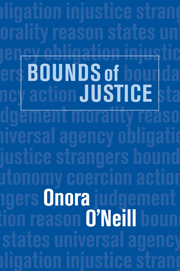Book contents
- Frontmatter
- Contents
- Preface
- Introduction
- Part I Philosophical Bounds of Justice
- Part II Political bounds of justice
- 7 Transnational economic justice
- 8 Justice, gender and international boundaries
- 9 Identities, boundaries and states
- 10 Distant strangers, moral standing and porous boundaries
- Bibliography
- Index
10 - Distant strangers, moral standing and porous boundaries
Published online by Cambridge University Press: 02 December 2009
- Frontmatter
- Contents
- Preface
- Introduction
- Part I Philosophical Bounds of Justice
- Part II Political bounds of justice
- 7 Transnational economic justice
- 8 Justice, gender and international boundaries
- 9 Identities, boundaries and states
- 10 Distant strangers, moral standing and porous boundaries
- Bibliography
- Index
Summary
DISTANCE AND STRANGENESS
Obligations to distant strangers were traditionally thought of as hospitality and succour. The stranger was one who arrived from afar, who entered market or camp or village, or who was encountered in the forest, the desert or on the high seas. Strangers in these cases are not distant: they are just strange or foreign. They are present, attractive or menacing, rich or needy, welcome or unwelcome, as the case may be. Their claims may be manageable or impossible, repudiatable or acceptable. The expectation is that these claims will be temporary, that strangers will soon distance themselves and claim no further hospitality.
The parable of the Good Samaritan belongs in this past world. On the lonely and dangerous road down to Jericho the man who fell among thieves and the Samaritan were face to face, and the Samaritan could use his strength, money, good sense and good will to treat a single nearby stranger as a neighbour. Despite the continuing resonance of the parable, the world in which hospitality and succour shown to lone strangers in our midst provide a model for all relations with strangers is now far away.
In our world, action and interaction at a distance are possible. Huge numbers of distant strangers may be benefited or harmed, even sustained or destroyed, by our action, and especially by our institutionally embodied action, or inaction – as we may be by theirs. Perhaps we have obligations not only to nearby but to distant strangers, or rights against them. Many people – let us call them (loosely) cosmopolitans – think that we have such rights and obligations, and that justice extends beyond borders.
- Type
- Chapter
- Information
- Bounds of Justice , pp. 186 - 202Publisher: Cambridge University PressPrint publication year: 2000
- 1
- Cited by



